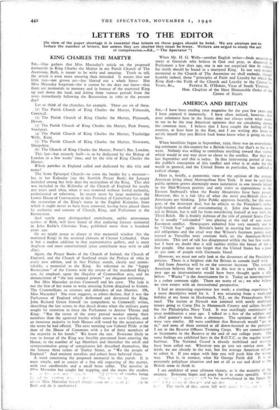LETTERS TO. THE EDITOR -
[In view of the paper shortage it is essential' that letters on these pages should be brief. • We are anxious not to reduce the number of letters; but unless they are shorter they must be fewer. Writers are urged to study the art of compression.—Ed., " The Spectator "1
KING CHARLES THE MARTYR
SIR,—One gathers that Miss Macaulay's article on the proposed memorials to King Charles the Martyr in my Parish Church of The Ascension, Bath, is meant to be witty and amusing. Truth to tell, the article is even more amusing than intended. It means that our little tree—not grown yet—has blotted out a whole forest. Has Miss Macaulay forgotten—for it cannot be she does not know—that there are memorials in memory and in honour of the martyred King up and down the land, and dating from various periods from the years immediately following the Restoration in 166o to the present day?
Let us think of the churches, for example. There are six of these. (r) The Parish Church of King Charles the Martyr, Falmouth, Cornwall.
(2) The Parish Church of King Charles the Martyr, Plymouth, Devon.
(3) The Parish Church of King Charles the Martyr, Peak Forest, Stockport.
(4) The Parish Church of King Charles the Martyr, Tunbridge Wells, Kent.
(5) The Parish Church of King Charles the Martyr, Newtown, Shropshire.
(6) The Church of King Charles the Martyr, Potter's Bar, London.
This last—but recently built—is to be dedicated by the Bishop of London in a few weeks' time, and by the title of King Charles the Martyr.
Whole parishes in England called and dedicated by this title and name!
The Scots Episcopal Church—to cross the border for a moment— has in her Kalendar (see the Scottish Prayer Book) for January included among her holy days the martyrdom of the King. This also was included in the Kalendar of the Church of England for nearly 200 years until 1859, when it was removed without lawful authority, ecclesiastical or otherwise. In recent years by large majorities the Lower House of Convocation in this Province of Canterbury has urged the restoration of the King's name in the English Kalendar, from which it ought never to have been removed, having been placed there by authority and consent of Church, King, and Parliament at the Restoration.
And surely your distinguished contributor, unlike anonymous scribes of Bath, will have heard of that enduring literary memorial in John Keble's Christian Year, published more than a hundred years ago.
Or we might pause to glance at that memorial window (for the martyred King) in the restored cloisters of Chester Cathedral. Ours is but a modest addition to that representative gallery, and is most Anglican and most constitutional (your contributor may wish to add Alas).
Again, the Prayer Books of the Church of Ireland, the Church of England, and the Church of Scotland retain the Preface of 1662 in every new edition, and in that Preface stands, clearly and unmis- takably, a memorial to the King. Its reference to the " happy Restoration" of the Crown with the return of the murdered King's son, its emphasis upon the illegality of Cromwellian acts, and its denunciation of " the late usurped powers" are eloquent testimony.
But Miss Macaulay praises Cromwell and his crew. The lady is not the first of her name to write amusing fiction disguised as history. The Cromwellians as creators and defenders of our liberties. Oh, Miss Macaulay! She even suggests, as others declare, that it was the Parliament of England which dethroned and destroyed the King. John Richard Green himself (so sympathetic to Cromwell) writes, describing the last scenes in that dread drama when the military party sought by terrorism to force the Parliament to destroy Throne and King: " But the terror of the army proved weaker among their members than the agonised loyalty which strove to save Charles, and an immense majority in both Houses still voted for the acceptance of the terms he had offered. The next morning saw Colonel Pride at the door of the House of Commons with a list of forty members of the majority in his hands." We know the rest. Everyone likely to vote in favour of the King was forcibly prevented from entering the House, to the number of 143 Members and thereafter the small and unrepresentative group of conspirators left described themselves, like the famous three tailors of Tooley Street, as " We the people of England." And eminent novelists and .others have believed them.
A word concerning the proposed memorial in this parish. It is most simple, and to consist of a fine old engraving of the martyr, with two candlesticks and a small brass tablet. The novelist in M;-• Macaulay has caught her napping, and she treats the readers o Om-, and 'cr., 'e' candles being by 't-vottes I shut This w- ,o; he here un'css Miss Macaulay bersel should one on c—et p"! A;e to Bath and do it unobservel.
When Mr. H. G. Wells—another English writer—finds occasion to sneer at Generals who believe in God and pray, as discussed in Parliament a few days ago, one is not too surprised that fit subject for mirth should be found in a martyred King. In our very modest memorial at the Church of The Ascension we shall embody, though hiimbly indeed, those " principles of Faith and Loyalty for which the King died—the Faith of the Church and Loyalty to the Crown:'--
Yours, &c., PATRICK K. O'HoRax, Vicar of South Tiverton. Hon. Chaplain of the Most Honourable Order of
Crown of Stuart.






































 Previous page
Previous page